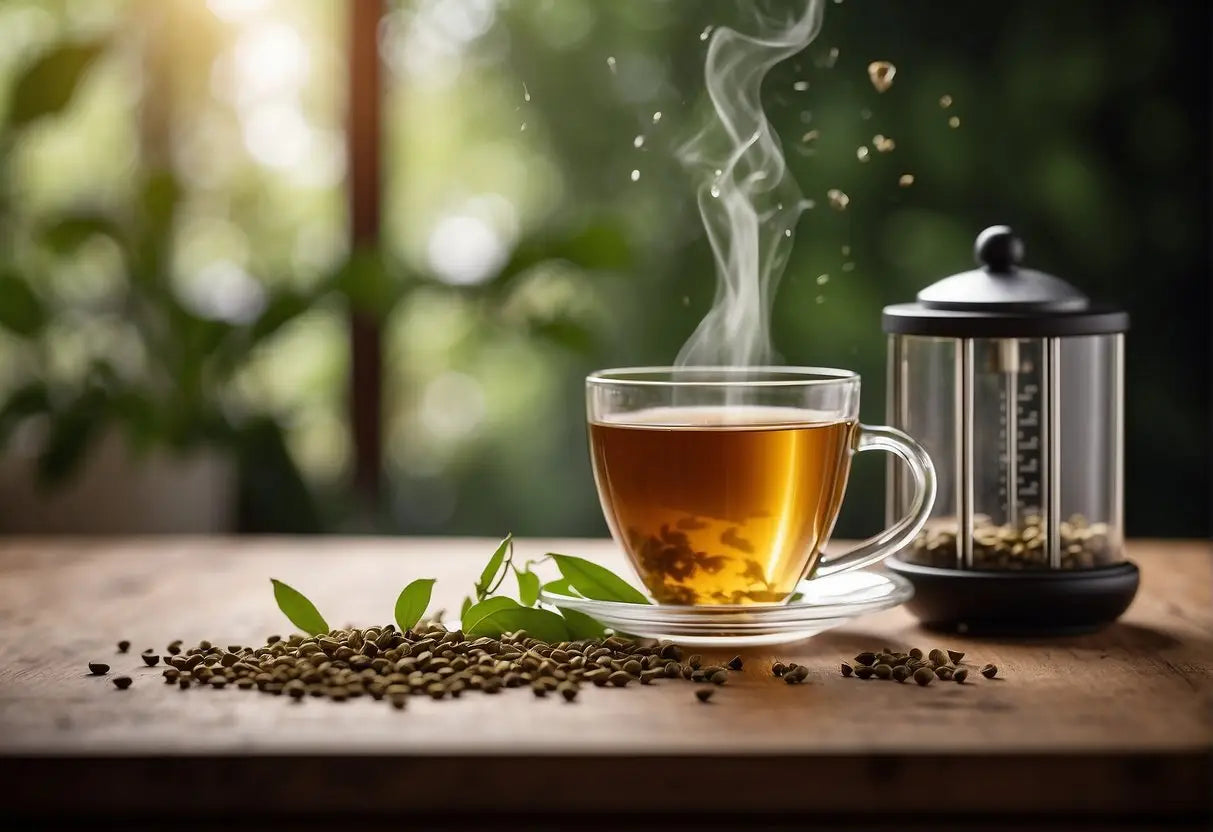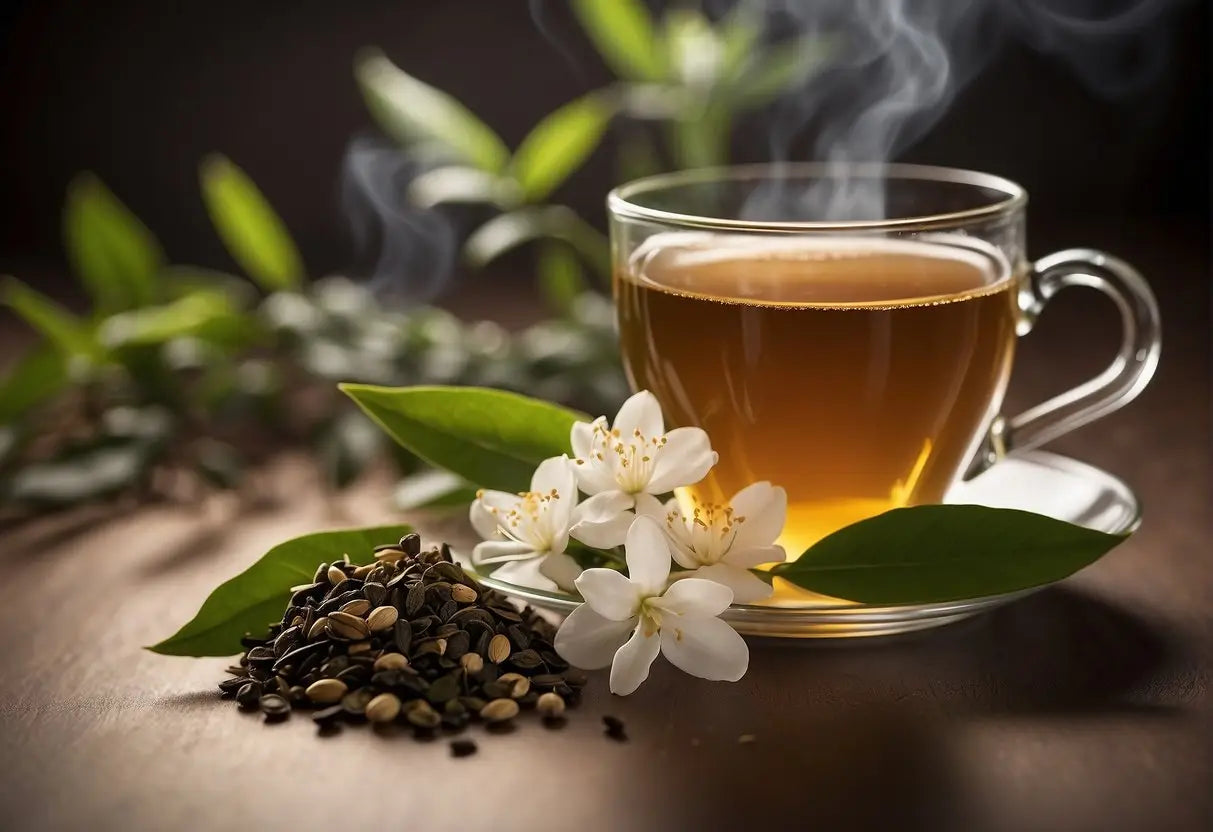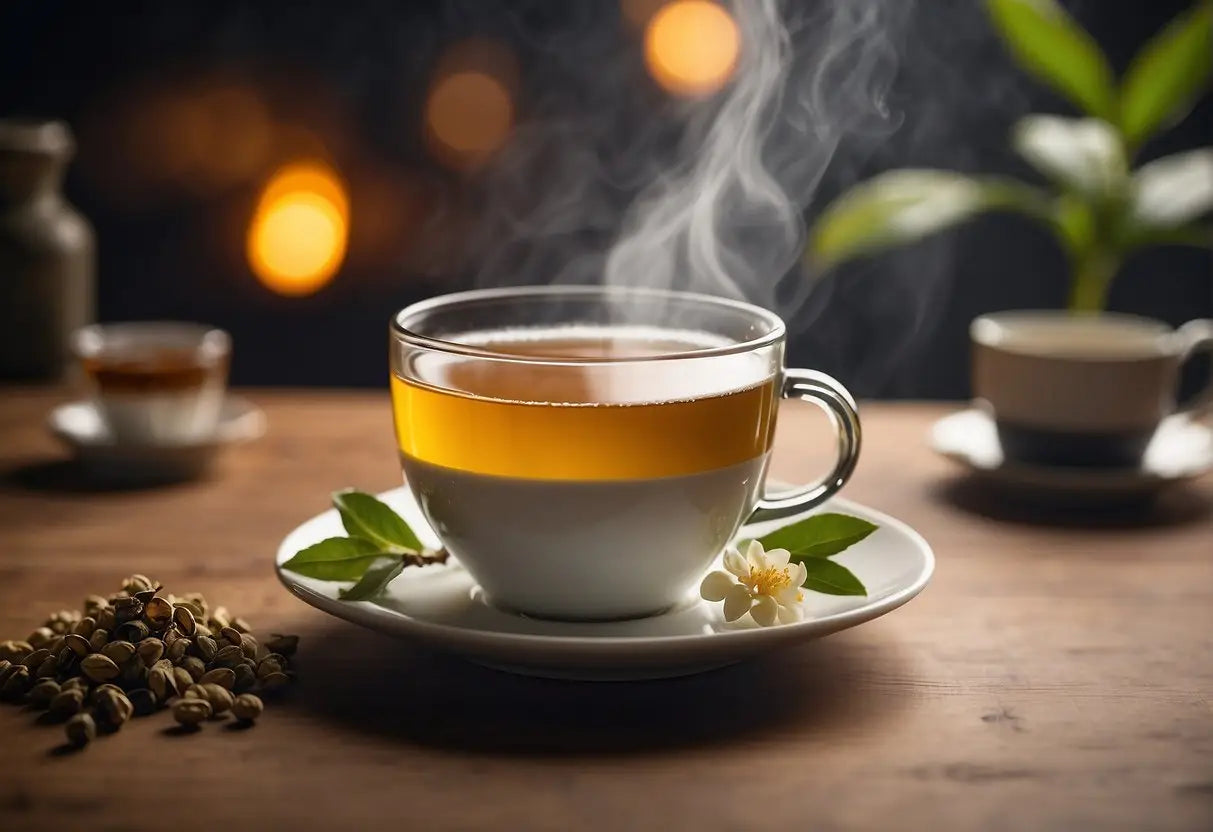How Much Caffeine in Jasmine Tea
When you drink jasmine tea, you're consuming a beverage that has been infused with the fragrance of jasmine blossoms. This tea typically uses a base of green tea leaves, which naturally contain caffeine. The exact amount of caffeine in your jasmine tea can vary depending on several factors, including the type of tea leaves used and the brewing time.
Typical Caffeine Content:
-
Green Tea Leaves Base:
The caffeine content generally ranges from 15 to 60 milligrams per 8-ounce serving. -
White Tea Leaves Base:
If your jasmine tea is based on white tea leaves, the caffeine content might be slightly lower, around 10 to 30 milligrams per 8-ounce serving.
Factors Affecting Caffeine Levels:
Bestsellers
- Steeping Time: The longer you steep your tea, the more caffeine will be released.
- Leaf Quality: Higher quality leaves tend to have more caffeine.
- Water Temperature: Hotter water can extract caffeine more efficiently.
To minimize your caffeine intake from jasmine tea, consider the following:
- Shorten the steeping time.
- Use cooler water.
- Opt for a decaffeinated variety if you are particularly sensitive to caffeine.
Remember, while jasmine tea contains caffeine, the amount is typically less than that of black tea or coffee. If you monitor your steeping time and the type of leaves used, you can enjoy jasmine tea with a controlled level of caffeine.
Factors Affecting Caffeine Levels

The caffeine content in jasmine tea can vary due to several factors. Understanding these can help you estimate the caffeine levels in your cup of tea.
Type of Tea Leaves
Different types of tea leaves contain varying amounts of caffeine. For jasmine tea, which is typically made from green tea leaves, the caffeine content usually ranges from 15 to 60 milligrams per 8 oz cup. However, if jasmine tea is made using black tea leaves, the caffeine content could be higher, potentially aligning with the 25 to 110 milligrams found in black teas.
Steeping Time
The length of time the tea leaves are steeped in hot water affects caffeine extraction. A short steeping time of 1-2 minutes can yield roughly half the caffeine compared to tea that has been steeped for 3-5 minutes.
- 1-2 minutes: Minimal caffeine extraction
- 3-5 minutes: Increased caffeine extraction
Tea Leaf to Water Ratio
More tea leaves per cup results in higher caffeine content due to a greater concentration of leaves releasing caffeine into the water. Below is a guide to the leaf-to-water ratio:
- 1 teaspoon (2 grams) per 8 oz: Standard caffeine level
- 2 teaspoons (4 grams) per 8 oz: Higher caffeine concentration
Infusion Number
The number of times you infuse the tea leaves also plays a role. With each subsequent infusion, the tea leaves will release less caffeine.
- First infusion: Highest caffeine content
- Second infusion: Reduced caffeine content
- Third infusion: Significantly less caffeine
By considering these factors, you can more accurately determine the caffeine content present in your jasmine tea.
Health Considerations of Caffeine

When you consume caffeine, it acts as a central nervous system stimulant. Your alertness increases and you may feel more awake. However, it's important to monitor intake, as excess consumption can lead to health issues.
Moderation is Key:
For most adults, up to 400 milligrams of caffeine per day appears to be safe. This is roughly the amount in four 8-ounce cups of brewed coffee.
Lao Ban Zhang
Possible Side Effects of High Caffeine Intake:
- Insomnia: High caffeine intake can disrupt your sleep cycle.
- Anxiety: Excessive consumption may exacerbate anxiety symptoms.
- Digestive Issues: Caffeine can increase stomach acid and may cause discomfort.
- Addiction: Regular intake can lead to dependence and withdrawal symptoms.
Vulnerable Populations:
Certain groups should be more cautious with caffeine:
- Pregnant Women: Limited to less than 200 mg/day, as caffeine may affect fetal development.
- People with Heart Conditions: Caffeine can cause a rapid heartbeat and should be limited.
- Individuals with Anxiety Disorders: May experience heightened symptoms with caffeine.
Benefits When Consumed Responsibly:
- Cognitive Enhancement: May improve memory and reaction times.
- Physical Performance: Can increase adrenaline and release fatty acids from fat tissues, enhancing physical performance.
To ensure you stay within healthy limits, be aware of the caffeine content in jasmine tea, which varies but is generally lower than coffee and black tea. Track your consumption across all sources of caffeine, not just from jasmine tea.
Comparison With Other Teas

In comparing jasmine tea to other teas, it's important to note that jasmine tea usually consists of green tea leaves scented with jasmine flowers. Therefore, its caffeine content is similar to that of green tea, but can vary depending on processing and brewing times. Below you'll find how jasmine tea stacks up against other varieties in terms of caffeine content.
Green Tea
- Caffeine: 15-45 mg per 8 oz cup
- Characteristics: Jasmine tea, being a type of scented green tea, shares this range of caffeine content. Your cup of jasmine tea will typically fall within this spectrum assuming standard brewing procedures.
Black Tea
- Caffeine: 40-70 mg per 8 oz cup
- Characteristics: Black tea leaves are fully oxidized, which results in a higher caffeine content. If you're looking for less caffeine than black tea provides, jasmine tea can be a suitable alternative.
White Tea
- Caffeine: 10-35 mg per 8 oz cup
- Characteristics: White tea tends to have a slightly lower caffeine content compared to green tea due to its minimal processing. As such, jasmine tea may contain a bit more caffeine than most white teas.
Herbal Teas
- Caffeine: 0 mg per 8 oz cup
- Characteristics: Herbal teas—like chamomile, peppermint, and rooibos—are naturally caffeine-free. When you're aiming for no caffeine but still want a flavorful tea experience, herbal selections are the best choice. Jasmine tea does contain caffeine, so it won't be an equivalent substitute if you're avoiding caffeine altogether.
Methods of Measuring Caffeine Content
When you're looking to determine the caffeine content in jasmine tea, several scientific methods are at your disposal. The two most common and accurate methods are High-Performance Liquid Chromatography (HPLC) and Gas Chromatography-Mass Spectrometry (GC-MS).
-
HPLC is a technique that separates, identifies, and quantifies each component in a mixture. Here's how it works for caffeine measurement:
- A sample of tea is prepared and introduced to the HPLC instrument.
- The liquid sample moves through a column packed with a solid adsorbent material.
- Caffeine and other components in the tea sample pass through the column at different speeds and are detected separately.
- The amount of caffeine is quantified based on its retention time and peak area in the chromatogram.
-
GC-MS combines gas chromatography and mass spectrometry to identify different substances within a test sample. This method follows these steps:
- The tea sample is vaporized and carried by an inert gas through a coiled column.
- Compounds separate based on their volatility and interaction with the column's lining.
- As they exit the column, they are analyzed by mass spectrometry, which fragments the sample and identifies the caffeine by its unique mass fragment pattern.
Both methods require specialized equipment and trained personnel. For a more accessible measure, you can use spectrophotometry, which involves measuring the absorbance of light by the brewed tea, indicating the caffeine levels. However, this method may be less precise than HPLC and GC-MS due to potential interference from other compounds present in the tea.
Ways to Modify Caffeine Content
The caffeine content in jasmine tea can be modified through several variables, such as steeping time, type of leaves, and water temperature.
Adjusting Steeping Time
The longer you steep your jasmine tea, the more caffeine will be extracted. Here is a guideline:
- 1-2 minutes: Low caffeine release
- 3-5 minutes: Medium caffeine release
- Over 5 minutes: High caffeine release
Adjusting your steeping time can help control how much caffeine ends up in your cup.
Using Different Tea Leaves
Caffeine levels can vary depending on the type of jasmine tea leaves you use:
- Buds or tips: Higher caffeine content
- Mature leaves: Lower caffeine content
Choosing between buds and mature leaves will impact the caffeine content of your tea.
Altering Water Temperature
Water temperature can affect caffeine extraction. Consider these temperatures:
- 175°F (80°C): Less caffeine extraction
- 200°F (93°C) and above: Greater caffeine extraction
Using cooler water will result in less caffeine in your tea, while hotter water will extract more.
Frequently Asked Questions
In this section, you'll find straightforward answers about the caffeine content in jasmine tea and its related effects.
What is the average caffeine content in a cup of jasmine green tea?
A typical cup of jasmine green tea contains around 15 to 60 milligrams of caffeine, depending on factors such as steeping time, the amount of tea used, and the tea's quality.
Can drinking jasmine tea affect sleep quality due to its caffeine content?
Yes, jasmine tea can affect sleep quality because of its caffeine content. If consumed in the late afternoon or evening, it may make falling asleep more difficult for some individuals.
How does the caffeine level in jasmine tea compare to that in green tea?
Jasmine tea is usually made by infusing green tea with the scent of jasmine flowers, meaning its caffeine content is quite similar to that of green tea, ranging from 15 to 60 milligrams per cup.
Are there variations in caffeine content between different types of jasmine tea?
Different types of jasmine tea can have varying caffeine contents. Factors such as the type of green tea used as a base and the infusion process can lead to higher or lower caffeine levels.
What is the safe limit of jasmine tea intake in terms of caffeine per day?
For most people, the safe limit of caffeine intake is up to 400 milligrams per day. Considering the caffeine content of jasmine tea, one can easily enjoy multiple cups without surpassing this limit.
How does the caffeine in jasmine tea stack up against the caffeine in coffee?
Jasmine tea generally contains less caffeine than coffee. A standard 8 oz cup of coffee can contain 95 to 200 milligrams of caffeine, making jasmine tea a milder option for those seeking to reduce caffeine intake.
← Older post Newer post →











